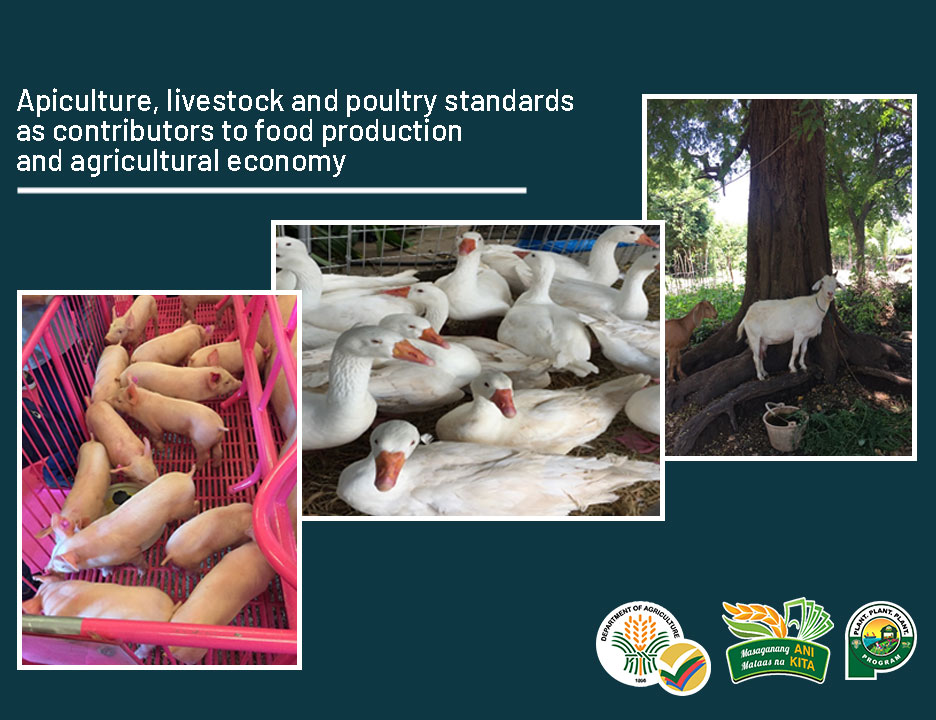
December 17, 2020. We are constantly reminded on the vital role of livestock and poultry sector by not only providing food in our table but also by giving us access to profitable livelihood. In 2009, the Food and Agricultural Organization (FAO) reported that the contribution of livestock and poultry sector in developing countries extends well beyond what is being produced for direct consumption and what is sold in the market. In the Philippines, the role of the livestock and poultry sector aims to aid in attaining food security and improve agricultural economy.
 However, these objectives cannot be achieved if the basic framework is not established. The Department of Agriculture through the Bureau of Agriculture and Fisheries Standards (BAFS) contributes to strengthen the framework of food safety, quality and agricultural economy through developing the Philippine National Standards for livestock, apiculture, and poultry. The role of BAFS in the said sectors is mandated by the different laws such as Republic Act (RA) 8435: The Agriculture and Fisheries Modernization Act (AFMA) of 1997, RA 10611: The Food Safety Act of 2013, RA 10068: The Organic Agriculture Act of 2011 and RA 10817: The Philippine Halal Export and Development Promotion Act of 2016. These voluntary standards aim to provide guidance in attaining product quality, food safety, animal welfare, environmental management, and worker’s health and safety.
However, these objectives cannot be achieved if the basic framework is not established. The Department of Agriculture through the Bureau of Agriculture and Fisheries Standards (BAFS) contributes to strengthen the framework of food safety, quality and agricultural economy through developing the Philippine National Standards for livestock, apiculture, and poultry. The role of BAFS in the said sectors is mandated by the different laws such as Republic Act (RA) 8435: The Agriculture and Fisheries Modernization Act (AFMA) of 1997, RA 10611: The Food Safety Act of 2013, RA 10068: The Organic Agriculture Act of 2011 and RA 10817: The Philippine Halal Export and Development Promotion Act of 2016. These voluntary standards aim to provide guidance in attaining product quality, food safety, animal welfare, environmental management, and worker’s health and safety.

The challenging task of BAFS is not limited in developing the specifications, grading, and classification of the livestock, apiculture and poultry products and its by-products. The Bureau also develops a comprehensive and systematic guide in the form of Good Animal Husbandry Practices (GAHP) or Codes of Practice. These standards set out the general principles of recommended practices and minimum requirements in the commercial or backyard rearing/farming of animals for food use.
To date, the Bureau has developed 32 Philippine National Standards (PNS) related to livestock, poultry, and apiculture since 2005. There are 6 PNS for by-products, 1 PNS for Apiculture, 6 PNS for poultry, 4 PNS for small ruminants, 6 PNS for large ruminants, 4 PNS for swine, and 5 general standards. Among these PNS, 18 are classified as end product specifications while 14 are formulated as codes of practice. The said PNS can still be further categorized as quality standards (14) and food safety standards (18).



 As the work is still in progress, the DA-BAFS, in collaboration with the Technical Working Groups and its partner agencies, continues its commitment to develop standards that will help local farmers produce safe, quality and globally competitive livestock and poultry products. Thus, in return contributing in making farmers’ livelihood secure and more profitable.
As the work is still in progress, the DA-BAFS, in collaboration with the Technical Working Groups and its partner agencies, continues its commitment to develop standards that will help local farmers produce safe, quality and globally competitive livestock and poultry products. Thus, in return contributing in making farmers’ livelihood secure and more profitable.
